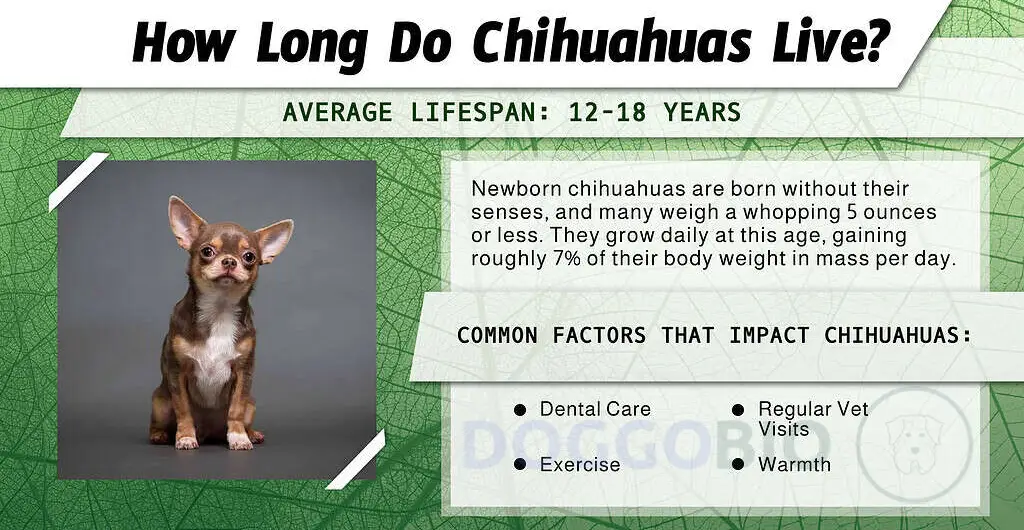When considering bringing a Chihuahua into your life, one of the most important questions you might ask is, “How long do Chihuahuas live?” On average, a Chihuahua can live anywhere from 14 to 16 years. This extended lifespan is a testament to their robust health when properly cared for, but it also means a long-term commitment for their owners.
In this discussion, we delve into the factors that contribute to the long lifespan of Chihuahuas, including genetics, diet, exercise, and regular veterinary care. We’ll also explore common health issues specific to this breed and how they can be managed or prevented to ensure your Chihuahua enjoys a long, healthy life.
Understanding these aspects is essential for anyone looking to welcome a Chihuahua into their home, as it not only prepares you for a lengthy companionship but also helps you provide the best care for your furry friend. Let’s explore the world of Chihuahua lifespan and dog health.
How Long Do Chihuahuas Live?
Chihuahuas typically live between 14 to 16 years, with some reaching up to 20 years. Known for their small size and vibrant personalities, Chihuahuas have a longer lifespan than many other dog breeds.
This longevity is attributed to their genetic solid composition and the attentive care they receive from their owners. Diet, exercise, genetics, and general health care can influence their lifespan. Proper attention to these aspects can help Chihuahua owners ensure a long and healthy life for their pets.
Life Cycle Stages

1.Newborns
The initial stages of a Chihuahua’s life are marked by vulnerability. As newborns, they depend entirely on their mother for nourishment and warmth. This stage lasts for a few weeks and is crucial for their overall development. Their immune system is still developing, making them susceptible to various health issues.
Owners must provide them with a warm, safe environment and closely monitor their health. Regular vet visits during this stage can ensure they are thriving and address potential health concerns.
2.Chihuahua Puppies
Chihuahua puppies enter a rapid growth and exploration phase as they transition from newborns. This stage lasts until they are about 6 months old and is characterized by boundless energy and curiosity.
It’s a time of learning and discovery, where they understand their environment and develop their personalities. Proper nutrition, early training, and socialization are crucial during this stage.
Owners should ensure a balanced diet to support their rapid growth and introduce them to various environments and stimuli to ensure proper social development.
3.Adults
The adult stage of a Chihuahua’s life is the longest and spans several years. During this time, they are at their peak regarding energy and health.
However, as they age, they may start to face health challenges. Regular health check-ups, a balanced diet, consistent exercise, and dental care are paramount during this stage.
It’s also a time for bonding, as Chihuahuas are known for their loyalty and affectionate nature. Owners should ensure that they have a routine and provide them with plenty of opportunities for play and exercise.
4.Senior Dogs
As Chihuahuas enter their senior years, they may start to slow down. This stage, which begins around age 10, is characterized by decreased energy and potential health issues.
Like all senior dogs, they may face reduced mobility, dental issues, and vision problems. However, they can still enjoy a good quality of life with proper care. Regular vet visits, a modified diet, gentle exercise, and plenty of love and attention can ensure they live their golden years in comfort and happiness.
Factors Influencing Chihuahua Lifespan
A myriad of factors influences the lifespan of a Chihuahua. By understanding and addressing these factors, owners can ensure that their Chihuahuas live a long and healthy life.

1.Breed Specifics
The genetic makeup of a Chihuahua plays a crucial role in its vulnerability to specific health challenges. Understanding their ancestry can aid in proactive measures and early intervention.
2.Gender Differences
Research indicates that female Chihuahuas generally have a longer lifespan than males. This difference stems from a combination of hormonal variations and distinct behavioral patterns.
3.Role of Genetics
Despite their resilience, Chihuahuas may have inherent genetic susceptibilities. Being informed about their heritage and potential hereditary concerns can facilitate early identification and timely care.
Common Chihuahua Health Problems
Chihuahuas, despite their robust constitution, are prone to specific health issues. Recognizing and addressing these concerns promptly can significantly enhance their quality of life.

1.Dental issues
Chihuahuas have small mouths, which can lead to overcrowded teeth. This, combined with their love for sweet treats, makes them prone to dental issues.
Regular dental check-ups, daily brushing, and a diet that supports dental health are essential. Dental problems, if left untreated, can lead to more severe health issues, so it’s crucial to prioritize dental care.
2. Obesity
Obesity is a common issue among Chihuahuas. Their small size and love for food can quickly lead to weight gain.
Obesity can lead to various health problems, including heart disease, diabetes, and joint issues. Owners should monitor their Chihuahua’s diet and ensure that they get regular exercise.
3.Osteoarthritis
Osteoarthritis is a degenerative joint disease that can affect older Chihuahuas. Symptoms include limping, stiffness, and a reluctance to move.
Regular vet check-ups, supplements, and a comfortable living environment can help manage this condition.
4.Hypoglycemia
Hypoglycemia, or low blood sugar, is a condition that can affect Chihuahuas, especially when they are young or under stress.
Symptoms include lethargy, shaking, and, in severe cases, seizures. It’s essential to monitor their blood sugar levels and provide them with a balanced diet.
5.Patellar Luxation
Patellar Luxation is a condition where the kneecap dislocates from its normal position. It’s a common issue among small breeds and can lead to lameness and pain. Regular vet check-ups and a healthy diet can help manage this condition.
6.Hydrocephalus
Hydrocephalus, commonly known as “water on the brain,” is a condition with excessive cerebrospinal fluid accumulation in the brain. It can lead to neurological issues and requires prompt medical attention.
7.Heart problems
Chihuahuas can be prone to heart conditions, especially as they age. Regular check-ups, a balanced diet, and early detection are crucial for managing these conditions.
8.Respiratory concerns
Due to their small size and flat face, Chihuahuas can be prone to respiratory issues. Ensuring they live in a clean environment and are not exposed to extreme temperatures can help prevent these problems.
Tips For Extending Your Chihuahua’s Lifespan
Every Chihuahua owner aspires to ensure their furry companion lives a long, healthy life. Here are some tips to help achieve that goal.

1.Dental Health Maintenance
Given their predisposition to dental issues, regular dental care is non-negotiable. This includes daily brushing, professional cleanings, and providing dental chews.
2.Regular exercise
Regular exercise, tailored to their size and age, is crucial for their physical and mental well-being. Whether it’s a brisk walk around the block or playtime indoors, ensuring they remain active can prevent obesity and related health issues.
3.Importance of Vaccination
Vaccinations play a pivotal role in preventing various diseases. Ensuring your Chihuahua is up-to-date with their shots can protect them from life-threatening conditions.
4.Schedule Regular Checkups
Routine health check-ups play a crucial role in preempting potential health issues. Regular screenings, vaccinations, and dental check-ups can ensure they remain in peak health.
5.Diet and Nutrition
Regular exercise, tailored to their size and age, is crucial for their physical and mental well-being. Whether it’s a brisk walk around the block or playtime indoors, ensuring they remain active can prevent obesity and related health issues.
6.Spaying and Neutering
This not only prevents unexpected pregnancies but can also prevent specific health issues and behavioral problems.
7.Mental Stimulation and Socialization
Mental stimulation and socialization are crucial for their emotional well-being. Regular play, training sessions, and social interactions can keep them mentally agile.
8.Avoiding Potential Hazards
Their curious nature can sometimes lead them into trouble. It is crucial to ensure their environment, like toxic plants and chemicals, is free from potential risks.
Frequently Ask Question
How Long Do Chihuahuas Live In Human Years?
Generally, a dog’s first two years equate to 24 human years, and every year after that roughly equals 4. So, a Chihuahua that’s ten years old would be approximately 56 in human years.
What Is The Lifespan Of A Teacup Chihuahua?
Despite their even smaller stature, Teacup Chihuahuas generally have a lifespan similar to standard Chihuahuas, ranging from 12 to 20 years.
However, due to their diminutive size, they can be more susceptible to health issues. Proper care, regular vet check-ups, and a balanced diet are essential to ensure their longevity.
How Long Do Long-haired Chihuahuas Live?
Long-haired Chihuahuas, with their luxurious coats, typically have a lifespan of 14 to 16 years, similar to their short-haired counterparts. Regular grooming is essential to prevent matting and skin issues.
How Long Do Apple-head Chihuahuas Live?
Applehead Chihuahuas, recognized by their round, apple-shaped skulls, generally live between 14 to 17 years. Their distinct head shape doesn’t significantly impact their lifespan compared to deer head Chihuahuas.
How Long Do Deer Head Chihuahuas Live?
Deer-head Chihuahuas, with their elongated heads and larger ears, have a lifespan similar to appleheads, averaging around 14 to 17 years.
Conclusion
In conclusion, the lifespan of a Chihuahua, often extending from 12 to 20 years, is a remarkable aspect of this breed’s appeal. This extended “Chihuahua Lifespan” is not just a matter of genetics but also a reflection of dedicated care and attention to dog health.
Factors such as regular veterinary check-ups, a well-balanced diet, exercise, and a nurturing environment play pivotal roles in ensuring these small dogs live long and healthy lives. By focusing on comprehensive dog health and wellness, owners can significantly contribute to the longevity and quality of life of their Chihuahuas.
In essence, while Chihuahuas are known for their petite size, their potential for a long, fulfilling life is anything but small, offering years of companionship and joy to those who care for them.
